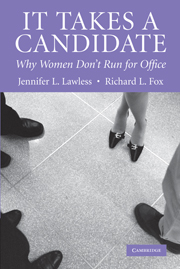Book contents
- Frontmatter
- Contents
- List of Tables
- List of Figures
- Acknowledgments
- 1 Electoral Politics: Still a Man's World?
- 2 Explaining Women's Emergence in the Political Arena
- 3 The Gender Gap in Political Ambition
- 4 Barefoot, Pregnant, and Holding a Law Degree: Family Dynamics and Running for Office
- 5 Gender, Party, and Political Recruitment
- 6 “I'm Just Not Qualified”: Gendered Self-Perceptions of Candidate Viability
- 7 Taking the Plunge: Deciding to Run for Office
- 8 Gender and the Future of Electoral Politics
- Appendix A The Citizen Political Ambition Study Sample Design and Data Collection
- Appendix B The Survey
- Appendix C The Interview Questionnaire
- Appendix D Variable Coding
- Works Cited
- Index
4 - Barefoot, Pregnant, and Holding a Law Degree: Family Dynamics and Running for Office
Published online by Cambridge University Press: 05 September 2012
- Frontmatter
- Contents
- List of Tables
- List of Figures
- Acknowledgments
- 1 Electoral Politics: Still a Man's World?
- 2 Explaining Women's Emergence in the Political Arena
- 3 The Gender Gap in Political Ambition
- 4 Barefoot, Pregnant, and Holding a Law Degree: Family Dynamics and Running for Office
- 5 Gender, Party, and Political Recruitment
- 6 “I'm Just Not Qualified”: Gendered Self-Perceptions of Candidate Viability
- 7 Taking the Plunge: Deciding to Run for Office
- 8 Gender and the Future of Electoral Politics
- Appendix A The Citizen Political Ambition Study Sample Design and Data Collection
- Appendix B The Survey
- Appendix C The Interview Questionnaire
- Appendix D Variable Coding
- Works Cited
- Index
Summary
Politicians at the highest levels of office frequently refer to their families when explaining their career decisions. According to back channels, one of the reasons Colin Powell did not run for president in 1996 or 2000 was because his spouse opposed his candidacy. Susan Molinari (R-NY) was a rising star in the Republican party when she announced her decision to leave the House of Representatives in 1996. She accepted a position as an anchor of a CBS news program so that she could spend more time with her daughter, Ruby. In an interview with National Public Radio, House member J. C. Watts (R-OK) stated that he did not plan to seek reelection in 2002 because “you can't be so concerned about saving America's families that you mess around and lose your own family…. There has to be a balance.” In 2003, U.S. Senator Peter Fitzgerald (R-IL) chose not run for a second term because he believed the schedule made it impossible to be both a father and a senator. More recently, Robert F. Kennedy Jr. announced that he would not enter the race for New York's Attorney General because he did not want to sacrifice time with his wife and six children: “[I want] to make a difference in their lives while I still can.”
It is not only high-level elected officials who rely on family circumstances to justify their decisions to exit the political sphere.
- Type
- Chapter
- Information
- It Takes a CandidateWhy Women Don't Run for Office, pp. 51 - 74Publisher: Cambridge University PressPrint publication year: 2005



